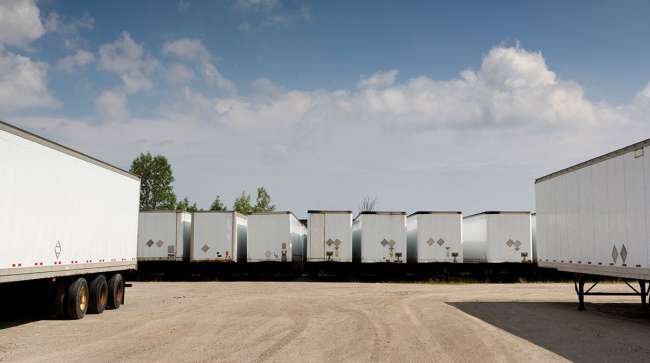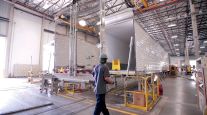January Trailer Orders Clear 26,000

[Stay on top of transportation news: Get TTNews in your inbox.]
U.S. trailer orders in January kept pace with a month earlier at about 26,000 but were down 13% compared with the 2021 period, ACT Research reported, citing manufacturers’ preliminary data.
Preliminary orders were 26,100 compared with 31,340 a year earlier. December’s net orders were 26,382, according to ACT.
Trailer makers said there were signs of good news.

Giesen
David Giesen, vice president of sales for Stoughton Trailers, said, “At least lately, we have been able to stop the bleeding on labor and maintain or slightly grow our workforce. We hope this will continue.”
Hyundai Translead Chief Sales Officer Sean Kenney said demand remains high “amid the varied economic news in the media.”
Said Chris Hammond, executive vice president of sale at Great Dane: “COVID has slowed down over the past few weeks, and that’s good news for everyone. But while everyone is talking more optimistically, the reality is every day has a new set of challenges for trailer and truck body builders.”
ACT Research: Preliminary US Trailer January Net Orders Match the Year-End 2021 Pacehttps://t.co/Lta54ABogu — ACT Research (@actresearch) February 11, 2022
Fleets will continue to struggle to acquire equipment through the year, said Frank Maly, director of transportation analysis and research for ACT.
He expects trailer makers to ramp up volume throughout 2022, but the pace will be slower “than both they and fleets would prefer.”
“I certainly hope the supply chain will smooth out. Right now, it’s crazy choppy,” Maly said. “It looks consistent. But that consistency is coming with phenomenal effort. It’s a bumpy road when you get down into the details.”
One equity analyst said he was told trailers are at a premium.

Seidel
“Warehouses are full. Price increases are 30-70%, and people are begging for [more] square footage,” said Jason Seidel, an equity analyst with Cowen and Co., describing what a trailer leasing company executive told him.
“They have 60,000 trailers and not one to lease,” Seidel said. “And he got only 10% of his order.”
FTR pegged preliminary orders at 26,300.
Don Ake, vice president of commercial vehicles for FTR, agreed overall orders in the past few months have been consistent.
“Except that with the trailer maker breakdown, it’s far from consistent,” he said.
One month, a couple of trailer makers will put in “bunches of orders” and the rest not enter much at all, he said.
“The next month, the ones who didn’t enter orders the month before, they’ll place orders and the other ones won’t,” Ake said. “Rather than the market being in balance, trailer makers are keeping the market in balance. They have tons of commitments. It’s just what of those they choose to enter on a monthly basis.”
One trailer maker chose this time to solidify how it goes to market with all its products.
Wabash National Corp. recently rebranded itself under the name Wabash. All legacy brands, including Supreme, Walker, Brenner, Bulk, Transcraft and Benson, will go to market under that new banner.
Our new brand represents who we are as a company. We even have a new website - https://t.co/znrhAFjT7d! We’re excited about this brand change and what it means for our employees, customers, suppliers, and community partners. #WeAreOneWabash pic.twitter.com/GnEDHB9EiQ — Wabash (NYSE: WNC) (@OneWabash) February 3, 2022
“We feel extremely comfortable based on feedback from our largest customers,” Wabash CEO Brent Yeagy said during the company’s most recent earnings call. “As well, our dealer body is enthused with the direction that we’re going. So, where we anticipated possible pushback, we got the opposite, which was embracing the idea.”
He added in 2022 Wabash’s proprietary molded structural composite technology will go to market as EcoNex Technology and be aimed at temperature-controlled applications.
In related news, Meritor Inc. announced its long-term agreement with Wabash has been extended through Dec. 31, 2026. The extension is Meritor’s first five-year agreement with Wabash. It covers axles, a system for tire inflation, lightweight suspensions, air disc brakes and automatic slack adjusters.
Want more news? Listen to today's daily briefing above or go here for more info
Hammond said Great Dane’s FleetPulse trailer telematics product “continues to be a focus for our customers looking for the most comprehensive solution to data today and for data in the future.”
Hyundai Translead’s Kenney pointed out many fleets are looking for an increased focus on productivity beyond weight reduction, corrosion mitigation and durability.
“These productivity solutions come in the form of both improved equipment utilization and minimized damage in the midst of operation,” he said.
Looking ahead, operationally what is likely to change?
Certainly, environments like the one trailer makers have been operating in leave their mark on the industry, Kenney said. “From certainty around cost and availability, to safety, and stock levels of product across the business, these most recent events have changed the way the industry does business.”
Giesen said Stoughton continues to look at automating and process improvement.
“Processes in the past that did not quite fit an ROI for automation,” he said, “now are looked at due to the lack of labor and rising cost of labor.”




